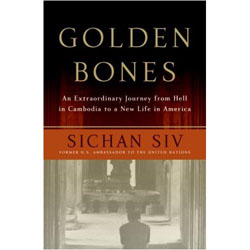In a reading at TC, a former U.S. Ambassador recounts his 1976 escape from the Khmer Rouge
Every now and then, we get a powerful reminder of just how America—even with all its problems—can sometimes provide great opportunities, especially to foreigners escaping tyranny.
Golden Bones: An Extraordinary Journey from Hell in Cambodia to a New Life in America (HarperCollins Publishers, 2008) is one such reminder. Its author, Sichan Siv, who gave a reading at TC on October 28, was a young man during the bloody reign of the Khmer Rouge in Cambodia. The title is taken from an old Cambodian saying that a child who is very lucky is born with golden bones. Suspected (correctly) by the Khmer Rouge of being a college graduate and a teacher, Siv escaped certain execution by denying his academic credentials. Still, he was imprisoned and put in a labor camp, as was everyone in Cambodia who was not a member of the Khmer Rouge. Golden Bones is the story of his daring escape first to Thailand and then to the United States, and his subsequent rise from taxi-cab driver and fast food worker to a high position in the administration of President George H.W. Bush and as U.S. representative to the U.N. General Assembly and Security Council under George W. Bush.
In a clear voice, fluent English and an affable manner, Siv told the TC audience of 79 his story. On April 17, 1975, Siv was a young man working for the relief agency CARE in Phnom Penh. On his way to his office, he said he saw “a group of heavily armed black-clad zombies walking toward the city center and me. I reversed quickly and went to the Hotel Le Royal, which had been turned into a Red Cross neutral zone. A doctor friend waited inside while I climbed over the locked gate. He and his colleagues had set up an emergency room and asked if I could be the interpreter. I said yes, and spent all day with the medical staff...We all thought, ‘The war is over, we will now have peace! We are all Cambodians and will work together to rebuild the country.’”
Sadly, they were wrong. The five-year civil war between the Khmer Rouge and allied communist forces on one side, and the Republican government, supported by the U.S., on the other, ended with the invasion of the Khmer rouge into Phnom Penh. But when the Khmer Rouge took power, it forced the evacuation of all civilians into the countryside, where they were relocated to labor camps in rural villages.
“Our family left [Phnom Penh] that evening of April 17, the darkest night of our lives, with just what we could carry. Three million people were trying to get out at the same time. Many died along the roads to nowhere from hardship, exhaustion and summary execution.
“It took us 10 days to make it to Tonle Bati, my father’s native village, usually reached in one hour by car. We were immediately put to forced labor. I planned my escape as soon as I realized that as someone who had worked for an American organization, I was endangering everyone else.”
With his mother’s blessing, Siv departed on bicycle, riding three weeks and some 500 miles across the country. He threw away his glasses, which were a dangerous sign of being educated; invented a new name for himself; lied about his qualifications and experiences, and faked travel passes to avoid detection by the Khmer Rouge. He was eventually stopped and put into a Khmer Rouge “mobile work unit” (effectively a concentration camp). “Each night, after 18 hours of hard labor, I prayed that if my mother’s milk were dear, I would see freedom.”
In February 1976, Siv escaped again, jumping off a logging truck and making a three-day journey through the heavily mined and patrolled jungle. He was severely wounded when he fell into a booby trap, but he made his way to Thailand, where he was jailed for illegal entry and later transferred to a Thai refugee camp. There, he taught English to fellow refugees.
Siv left Thailand for the United States under the sponsorship of an American family, a common arrangement for people in refugee camps in Thailand after the war. On June 4, 1976 at age 28, he arrived at the home of his sponsor family in Wallingford, Connecticut. “I was full of hope and eager to start my new life as a free man. I did whatever came my way,” including apple picking and driving a taxi. Eventually he earned a master’s degree in international affairs from Columbia University, and, to better understand the presidential electoral process, volunteered for the 1988 presidential campaign of George H.W. Bush. The latter work led to Siv’s appointment as Deputy Assistant to the second President Bush—exactly 13 years after his escape to freedom began.
“I came to learn that my mother, along with my older sister, brother and their families, had been clubbed to death by the Khmer Rouge. Of the 16 of us who left Phnom Penh together on April 17, 1975, I am the only survivor.”
Siv’s reading was sponsored by the Biobehavioral Sciences Department, which is developing international service provision and student training programs in Cambodia and elsewhere. The Cambodia Project, Inc., was a co-sponsor.
Golden Bones: An Extraordinary Journey from Hell in Cambodia to a New Life in America can be found at bookstores nationwide.
Published Tuesday, Jan. 6, 2009
